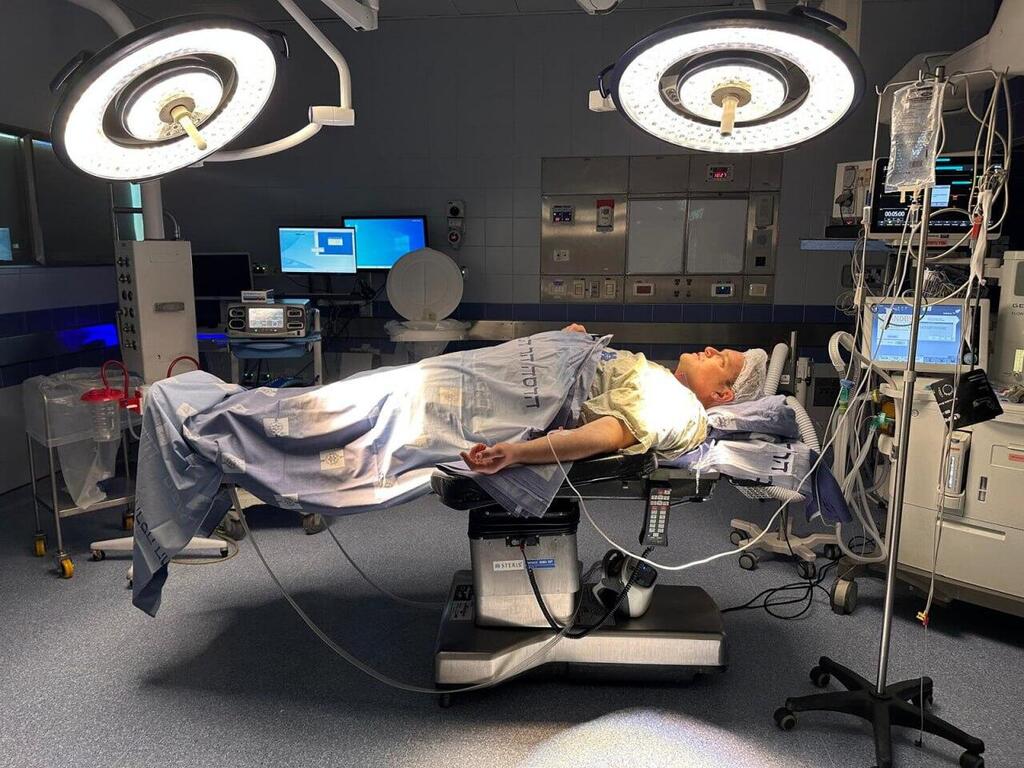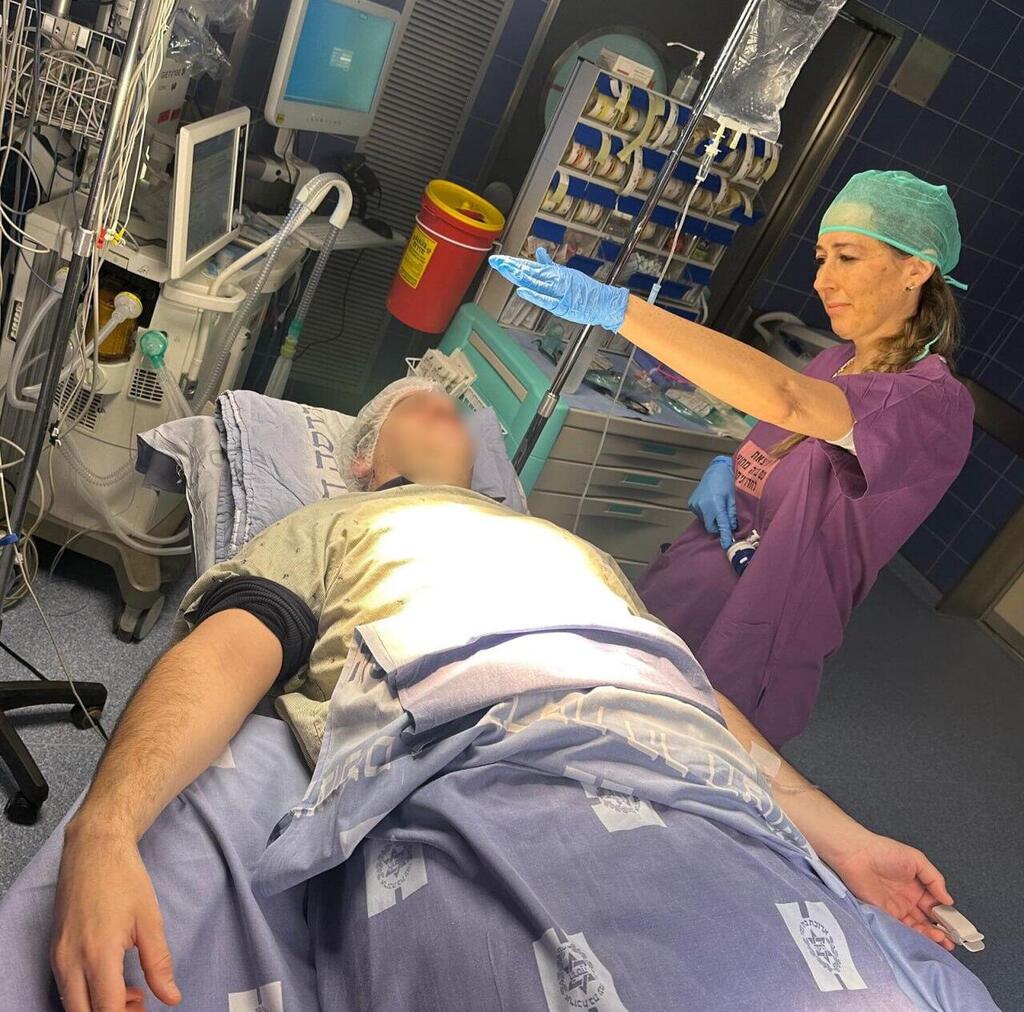A real operating room, a surgeon in a gown, IV drip and monitors — but no scalpel. In a groundbreaking study at Hadassah Medical Center’s Mount Scopus campus, a bariatric surgery procedure is being simulated using hypnosis. The preliminary results are encouraging, but the research team says several more months remain before the full study is complete.
Most participants lost an average of 10 percent of their body weight within three months. “I’m no longer tempted by pastries,” says one participant. “It’s really magic.”
3 View gallery


Bariatric surgery being simulated using hypnosis. “Feels like a real surgery”
(Photo: Tamar Haratz Barkai)
A few years ago, “Rose” (alias) from Jerusalem underwent a conventional bariatric surgery that initially helped her shed about 60 kg (132 lb). But over time, as happens with many bariatric surgery patients, her weight gradually rose again. “The ‘honeymoon period’ ended and the demons returned,” she says.
She tried weight‑loss injections but suffered severe side‑effects, and it seemed a second surgery would be unavoidable. “I felt hopeless after I couldn’t lose weight on my own; I was truly afraid I’d have to cut into my body again,” she says. Less than a year ago, she was introduced for the first time to this initial study at Hadassah that changed everything.
In the study currently underway at the hospital, patients suffering from extreme obesity undergo a simulated “gastric‑shortening” operation, carried out in a real operating room, but using hypnosis only.
Importantly, unlike real bariatric surgery and unlike weight‑loss medications, hypnosis lacks a sufficiently strong research base for treating obesity.
The study is led by psychologist and certified hypnotherapist Maya Mizrahi and managed by a multidisciplinary team of specialists from Hadassah and Hebrew University of Jerusalem.
It is open to both former bariatric surgery patients and those who have never had surgery. Early results show that within just three months, most participants lost about 10 percent of their body weight, a result comparable to the efficacy of some of today’s approved weight‑loss drugs.
A few months ago, Rose, now 69, underwent the hypnotic “operation.” In the week following the procedure, she was instructed to follow a strict diet including liquids and soft‑texture food, just as standard post‑surgery patients are.
“I was worried I wouldn’t handle it, but I was surprised,” she says. “All my life I held myself back from eating. And suddenly, Maya played with my mind and things changed. Now I go to cafés and it’s not hard anymore to pass on the pastry next to my coffee; it’s no longer a problem. It’s magic. Who would’ve believed it? There’s hope in this study.”
The innovative experience engages all the senses: patients are asked to fast on the day before the “surgery”, and on the day of the “surgery” they are dressed in a gown and surgical garments, connected to an EKG, an IV (without a needle) and a monitor that tracks heart rate and blood pressure.
Mizrahi, dressed as a surgeon, leads the patient into the cool, brightly lit operating room. There, the patient first receives a visual briefing of the surgical steps, then is placed into a hypnotic state.
For 50 minutes, Mizrahi walks each patient step by step through the surgical process of a sleeve gastrectomy, a procedure that reduces the size of the stomach, including the medical equipment used and where incisions would typically be made.
“The brain doesn’t distinguish between reality and imagination,” she explains. “By constructing a scenario in which the brain believes the body is undergoing surgery, the mind can recreate or trigger the same positive effects of an actual operation — sensations of fullness, self-control, confidence and motivation for change.”
3 View gallery


Yuval Wollhandler underwent the hypnotic surgery. “Results are encouraging”
(Photo: Tamar Haratz Barkai)
At the same time, throughout the hypnotic script, empowering and reinforcing messages are woven in, emphasizing satiety, discipline, a desire to exercise, and to plan meals. “Hypnosis isn’t magic,” Mizrahi says. “It’s a tool that helps a person tune in to the body and to both conscious and unconscious internal processes.”
Participants take part in five sessions that include guided self-hypnosis practice, follow-up conversations, phone check-ins and a printed nutritional guide. They also undergo blood tests to measure levels of ghrelin and leptin, hormones associated with hunger and fullness, to assess whether hypnosis impacts appetite regulation.
“I felt like I was going through the same experience again — the sounds, the smell, the cold in the operating room, the IV as if it were really there,” says Rose, who lost 17 kg (about 37 lb) in three months. “I was skeptical at first, but I figured I had nothing to lose. At worst, it might actually work.”
Yuval Wollhandler, 45, a male nurse and a combat medic in the army reserves, also took part in the study. “I didn’t want to have bariatric surgery. I know the statistics about weight regain, and it’s a serious procedure with significant risks,” he says. “When I heard about the study, I was excited — on the one hand, you get the benefits of the surgery, and on the other hand, you’re not in danger.”
Wollhandler says he has struggled with his weight most of his life, at one point reaching 145 kg (about 320 lb). About five years ago, he began an intensive weight-loss program and lost 30 kg (66 lb), but over the past two years, the weight crept back and he reached 133 kg (293 lb).
“The hypnotic surgery feels very real,” he says. “You truly feel like you’ve had surgery, so you find yourself actually sticking to the strict dietary rules that follow real surgery.” Wollhandler lost 25 kg (55 lb) in about five months. “It didn’t feel like a struggle. Even now, eight months later, some habits from the hypnosis remain, like planning all my meals for the day in advance.”
3 View gallery


Psychologist and certified hypnotherapist Maya Mizrahi with one of the patients
(Photo: Tamar Haratz Barkai)
“One of the major challenges in treating obesity is dissociation — a disconnect between the person and their conscious experience,” Mizrahi explains. “People eat on autopilot and are then surprised to find they’ve gained weight.
“That experience often stems from a disconnection between the mind and body or between emotion and logic while eating. The intervention we created helps patients reconnect with their body, and to work on the areas of choice, control and impulse.”
The idea for the study came from Mizrahi’s years of experience as a medical psychologist treating patients with obesity. “Patients started coming back after bariatric surgery saying, ‘I wish I could have this surgery every two years,’” she recalls. Research shows that within five years, 40% to 70% of bariatric patients regain weight.
Mizrahi notes that while hypnosis is used in some countries as a tool for weight loss, the field remains unproven. Furthermore, existing methods rely solely on guided visualization, whereas this study includes a tangible, physical simulation in a real operating room — a combination that may enhance the placebo effect of the faux surgery.
So far, 41 participants have enrolled in the study: 19 who previously had bariatric surgery and 22 who had not undergone any surgical procedure.
Preliminary results show that after just three months, 35 participants (86%) had begun losing weight. Among those who had previous surgeries, 66% lost more than 20% of their excess weight. In the group without any prior surgery, 55% achieved similar outcomes. The study is ongoing, and final results are expected within the year.
“I hope that this research leads to real clinical change,” Mizrahi says, “and that it introduces a targeted intervention to help address weight regain, possibly even integrating it into surgical departments at hospitals.”
The study is led by a multidisciplinary team that includes Dr. Tamar Elram, director of Hadassah Mount Scopus; Prof. Haggi Mazeh, head of the surgical department; Dr. Ronit Greenbaum, senior bariatric surgeon; and Dr. Yorai Tal Ron, psychiatrist at Hadassah Ein Kerem. They are joined by Prof. Danny Ben-Zvi, head of the metabolism and diabetes research lab at the Hebrew University of Jerusalem, and Dr. Eitan Abramowitz, psychiatrist and medical hypnosis specialist at the Hypno-Campus Institute.


